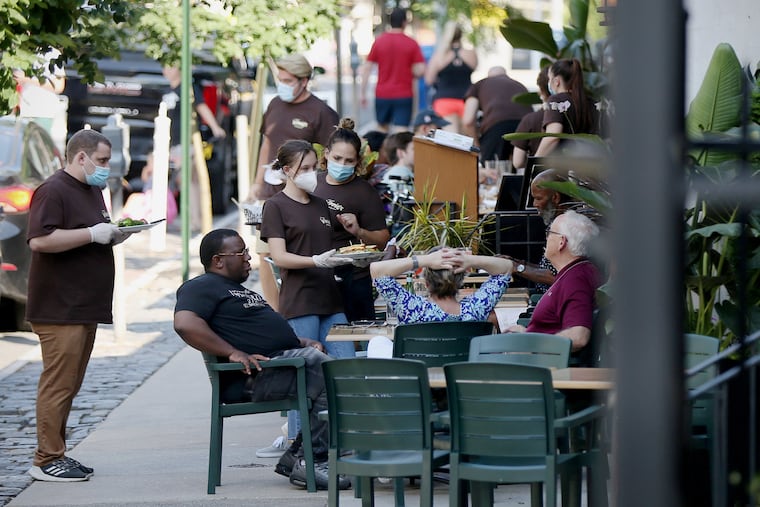Philadelphia City Council votes to cap third-party delivery fees and expand outdoor dining
Restaurateurs, reeling from the pandemic, are claiming victory. The legislation will temporarily allow more outdoor dining options.

Philadelphia’s restaurant industry, reeling from the pandemic, claimed wins Thursday, as City Council authorized a 15% cap on third-party delivery fees and agreed to relax outdoor-dining rules during the emergency.
The legislation awaits the signature of Mayor Jim Kenney. It is undergoing legal review, a city spokesperson said.
City Councilman Allan Domb called the legislation, which passed unanimously, “part of a smart restart” of the hospitality industry.
One issue vexing restaurateurs is the fees charged by food delivery companies such as Grubhub and DoorDash, which can be as high as 30%, cutting deeply into already thin margins.
Similar caps have been passed by cities including New York, Washington, Cincinnati, San Francisco, Los Angeles; and Seattle, to be effective during the emergency.
» READ MORE: Philadelphia City Council bill would cap fees that delivery services can charge restaurants
In addition, the ordinance, introduced by Councilmember Cherelle L. Parker, requires delivery services to list their fees and disclose if they do not have an agreement with a restaurant. Some services simply accept orders on restaurants’ behalf and handle the transactions. Restaurateurs say this can create confusion and ill will when orders go awry.
UberEats waived commission fees for some restaurants during the pandemic, and DoorDash and its new acquisition, Caviar, cut its fees in half. Grubhub allowed restaurants to defer payments. Though the services have soared in popularity, most are not profitable, according to analysts.
The legislation, which passed unanimously, drew praise from the Pennsylvania Restaurant and Lodging Association. Melissa Bova, its vice president of government affairs, said the 15% cap would consolidate and simplify the delivery services’ charges. Delivery charges will be capped at 10%, while any additional fees — “whatever else they are” — will be limited to 5%. She cautioned that the cap would end after the emergency.
A spokesperson for DoorDash called the caps “arbitrary” and said fees might be passed on to customers. “If price controls go into effect, we’ll have to raise the amount that customers pay to continue to provide the same level of service across our platform, which will ultimately lead to fewer people placing orders, which leads to fewer earnings opportunities for [DoorDash drivers], and which will ultimately hurt restaurant sales, the exact opposite intention of what these caps are meant to offer,” the spokesperson said.
DoorDash cited a partnership with the Pennsylvania Attorney General’s Office to help DoorDash and Caviar gig workers. The company also is working with Philadelphia and Pittsburgh to deliver groceries, meals, and supplies to vulnerable populations.
Two other bills, effective through Dec. 31, will expand outdoor dining and “streeteries” throughout the city.
Restaurants have been limited to takeout and delivery since March 16, providing only a trickle of revenue. Outdoor dining, with fewer seats, was allowed June 11. Indoor dining, at 50% capacity, could be allowed as soon as next Friday.
» READ MORE: Outdoor dining returns with fresh air, umbrellas — and social distancing
Under one bill, restaurants not only can obtain permission to operate a sidewalk cafe but can extend the cafe onto the sidewalk of a neighboring property with the owner’s permission. Domb, who introduced the legislation with Councilmember Bobby Henon, said restaurateurs can apply through the Department of Licenses and Inspections. If the district councilperson raises no objection, “they can be up and running in five days,” he said.
Another bill authorizes the Streets Department to temporarily close lanes of traffic and convert on-street parking spaces to allow restaurant seating. The bills were sponsored by Derek Green, Kenyatta Johnson, Curtis Jones Jr., David Oh, Katherine Gilmore-Richardson, Maria D. Quiñones-Sánchez, and Mark Squilla.
“Restaurants are trying to survive,” Michael Schulson, whose restaurant group includes Sampan, Double Knot, and Giuseppe & Sons, told Council in a Zoom meeting. “They’re not looking to get rich.” Schulson said his company workforce had dropped from 1,500 people to about 100.
“Their success is our success,” Domb, who has interests in real estate and restaurants, said in an interview. “We need to get these businesses back on track. People need their jobs back.”